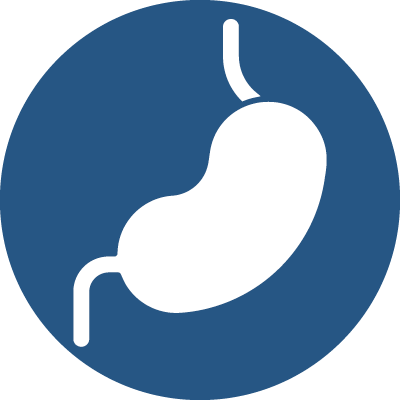About 5-10% of people with cystic fibrosis get DIOS.
The main symptom of DIOS is abdominal pain, often on the right lower side of your abdomen. The pain is crampy (comes and goes) and is often worse after eating. You may not feel as hungry as you usually do, or you may feel full sooner after eating. You may notice that you are having fewer bowel movements or that you still feel full after having a bowel movement.
What causes DIOS?
DIOS is caused by a combination of thick mucus and undigested fat from food getting stuck in the intestine, often where the small bowel and large bowel meet on the right lower side of the abdomen. The pain is due to contractions in the wall of the bowel as the body tries to push this thick sticky stool through the intestines. Factors that can contribute to DIOS include not taking enough pancreatic enzymes and being dehydrated. DIOS is more common in people with CF who had meconium ileus at birth or who have had surgery to their bowel. Some patients with cystic fibrosis get DIOS more often than others. You can still get DIOS when you take your enzymes properly. DIOS is similar to but not the same as constipation and does not exist except in people with CF.
DIOS is diagnosed by taking a history and feeling your abdomen. The diagnosis is confirmed with an X ray.
If you have a pain in the stomach that you think might be DIOS, call your CF clinic. If your DIOS is more severe, you may vomit and have more severe pain. If this happens, go to the emergency department of the hospital nearest to your home for treatment. Also call the CF doctor on call so we know you are unwell and can speak to the doctor at the emergency department.
How to treat and prevent DIOS
The thick mucus and stool must be washed out of your bowel using the same prep as is used for a colonoscopy (Peglyte or Golytely or Colyte). It usually takes 4 to 8 litres of Peglyte over a 4 to 8 hour period. This can be done at home. If you cannot drink all the Peglyte due to nausea or vomiting, you may need a tube put through your nose into your stomach. This tube is called a nasogastric, or NG, tube. You will then get the Peglyte through that tube. Usually you will have this treatment during the day in hospital.
Strategies to prevent DIOS from occurring include: adjusting pancreatic enzyme dose with the amount of fat ingested and regular use of PEG3350 (Restoralax or Laxaday) taken with 500ml – 1 litre of fluids. Some people will need medications to assist bowel motility and help food move through your intestines. The doctor or nurse in the cystic fibrosis clinic will tell you what the best option is for you.
Click here for instructions on how to complete an effective bowel clean out for DIOS or constipation.


